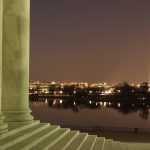 On February 16, 2017, CPIP hosted a panel discussion, America as a Place of Innovation: Great Inventors and the Patent System, at the Smithsonian National Museum of American History in Washington, D.C. The event was co-hosted by the Lemelson Center for the Study of Invention and Innovation at the Smithsonian Institution and the U.S. Read more
On February 16, 2017, CPIP hosted a panel discussion, America as a Place of Innovation: Great Inventors and the Patent System, at the Smithsonian National Museum of American History in Washington, D.C. The event was co-hosted by the Lemelson Center for the Study of Invention and Innovation at the Smithsonian Institution and the U.S. Read more
Tag: innovation
Creative Upstarts and Startups: How IP Creates Opportunities and Opens Doors
 This is the first in a series of posts summarizing CPIP’s 2016 Fall Conference, “Intellectual Property & Global Prosperity.“ The conference was held at Antonin Scalia Law School, George Mason University on October 6-7, 2016. Videos of the conference panels and keynote address, as well as other materials, are available on the conference website. Read more
This is the first in a series of posts summarizing CPIP’s 2016 Fall Conference, “Intellectual Property & Global Prosperity.“ The conference was held at Antonin Scalia Law School, George Mason University on October 6-7, 2016. Videos of the conference panels and keynote address, as well as other materials, are available on the conference website. Read more
CPIP, USPTO, & Lemelson Center Host “Great Inventors” Panel Discussion at American History Museum

On February 16, 2017, CPIP hosted a panel discussion, America as a Place of Innovation: Great Inventors and the Patent System, at the Smithsonian National Museum of American History in Washington, D.C. The event was co-hosted by the Lemelson Center for the Study of Invention and Innovation at the Smithsonian Institution and the United States Patent and Trademark Office (USPTO). Read more
New Paper Addresses Flaws in Patent Holdup Theory
 Stephen Haber and Alexander Galetovic of the Hoover Institution’s Working Group on Intellectual Property, Innovation and Prosperity (IP2) published a new working paper on the problems with Patent Holdup Theory. In “The Fallacies of Patent Holdup Theory,” Professors Haber and Galetovic show that Patent Holdup Theory is based on three fundamental errors. Read more
Stephen Haber and Alexander Galetovic of the Hoover Institution’s Working Group on Intellectual Property, Innovation and Prosperity (IP2) published a new working paper on the problems with Patent Holdup Theory. In “The Fallacies of Patent Holdup Theory,” Professors Haber and Galetovic show that Patent Holdup Theory is based on three fundamental errors. Read more
Letter on FCC Set-Top Box Regulation Once Again Confuses the Issue
Federal Circuit Brings Some Clarity and Sanity Back to Patent Eligibility Doctrine
By Adam Mossoff and Kevin Madigan
 Following the Supreme Court’s four decisions on patent eligibility for inventions under § 101 of the Patent Act, there has been much disruption and uncertainty in the patent system. The patent bar and most stakeholders in the innovation industries have found the Supreme Court’s decisions in Alice Corp. Read more
Following the Supreme Court’s four decisions on patent eligibility for inventions under § 101 of the Patent Act, there has been much disruption and uncertainty in the patent system. The patent bar and most stakeholders in the innovation industries have found the Supreme Court’s decisions in Alice Corp. Read more
Proposed CREATES Act Threatens Patent Owners’ Rights
By Erika Lietzan, Kevin Madigan, & Mark Schultz
 Earlier this month, a bipartisan group of Senators introduced the Creating and Restoring Equal Access to Equivalent Samples Act (or CREATES Act). The proposed bill is aimed at deterring what the bill’s author, Sen. Read more
Earlier this month, a bipartisan group of Senators introduced the Creating and Restoring Equal Access to Equivalent Samples Act (or CREATES Act). The proposed bill is aimed at deterring what the bill’s author, Sen. Read more
How Strong Patents Make Wealthy Nations
By Devlin Hartline & Kevin Madigan
 How did the world’s wealthiest nations grow rich? The answer, according to Professor Stephen Haber of Stanford University, is that “they had well-developed systems of private property.” In Patents and the Wealth of Nations, recently published in the CPIP Conference issue of the George Mason Law Review, Haber explains the connection: Property rights beget trade, trade begets specialization, specialization begets productivity, and productivity begets wealth. Read more
How did the world’s wealthiest nations grow rich? The answer, according to Professor Stephen Haber of Stanford University, is that “they had well-developed systems of private property.” In Patents and the Wealth of Nations, recently published in the CPIP Conference issue of the George Mason Law Review, Haber explains the connection: Property rights beget trade, trade begets specialization, specialization begets productivity, and productivity begets wealth. Read more
Acknowledging the Limitations of the FTC’s PAE Study
 The FTC’s long-awaited case study of patent assertion entities (PAEs) is expected to be released this spring. Using its subpoena power under Section 6(b) to gather information from a handful of firms, the study promises us a glimpse at their inner workings. Read more
The FTC’s long-awaited case study of patent assertion entities (PAEs) is expected to be released this spring. Using its subpoena power under Section 6(b) to gather information from a handful of firms, the study promises us a glimpse at their inner workings. Read more
No Consensus That Broad Patent ‘Reform’ is Necessary or Helpful
Here’s a brief excerpt of an op-ed by Adam Mossoff & Devlin Hartline that was published in The Hill:
Two recent op-eds published in The Hill argue that broad patent legislation—misleadingly labeled “reform”—is needed because the U.S. patent system is fundamentally broken. Read more
 Last week, a group of law professors wrote a
Last week, a group of law professors wrote a